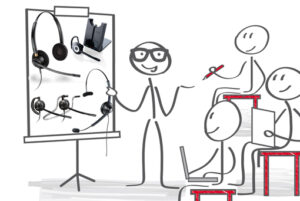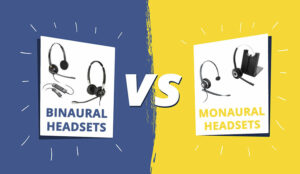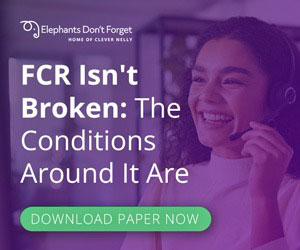Choosing the right headset for your contact centre isn’t always easy, especially with so many options available. So, what really matters when making the right choice?
To help, we asked our panel of experts to share their top advice on what to look for when buying headsets for the contact centre.
11 Expert Tips to Choose Contact Centre Headsets
1. Comfort and Durability
Headsets must be comfortable enough for long periods of use. Almost all business headsets will have comfortable ear cushions, but it could also be a good idea to have light, padded headbands so that no added pressure is put on the top of the head.
Headset durability is also a huge factor to consider. All things degrade with continual use and many of us are guilty of wheeling over our headset cord by accident or playing with our microphone when our attention is focused elsewhere!
Reinforced cords and flexible, 360° boom arms will help protect headsets from physical damage and preserve them for longer.
2. Noise Cancelling
Noise-cancelling headsets will reduce the burden of ambient background noise, lower the chance that customers will have to repeat themselves and reassure the caller that their conversation is being kept private.
Moreover, for larger, louder or more densely populated call centres, investing in an ultra-noise-cancelling headsets can help to block more background noise, so no background conversations can be overheard. This can be ideal for maintaining confidentiality.
For the best call clarity, headset microphones fitted with air-shock filters have the added bonus of filtering out sharp breathing and popping sounds.
To find out more about reducing noise in the contact centre, read our article: How to Reduce Background Noise During a Call – With Remote-Working Ideas
3. Business Compatibility

It’s important you select the headset that’s right for your business. There’s no ‘one headset fits all’.
While all headsets are designed to fit every head shape and size, users will always have a wide range of preferences that suit a myriad of individual roles and organisations.
The headset that works best for your business is vastly dependent on what type of business you run and what industry you operate in.
For example, extra security may be required if you work with sensitive financial data. This is why DECT wireless headsets, which provide digital encryption for secure calls, are preferred to Bluetooth-enabled options when it comes to business.
Contributed by: Nigel Dunn, VP and MD EMEA North, Jabra
4. A Comprehensive Warranty

Headsets are a vital tool for the team and they must be able to withstand near-constant use. Contact centres should ensure their headsets are covered by a comprehensive warranty.
Companies like Plantronics offer world-class after-care and one-, two or three-year warranty and replacement policies on all of their products, meaning that the contact centre can be confident that their investment is protected.
Talking to vendors is also a great starting point. Contact centres shouldn’t be shy about tapping into their wealth of experience at the beginning of their purchase process.
Contributed by: Paul Dunne Senior Director, EMEA Channel Organisation, Plantronics
5. Cost-Effectiveness
In an ideal world we all want the very best tech for our advisors, including headsets. We know that headsets carry huge benefits in the contact centre – they look professional, the advisor can work hands-free and can take more calls.
But headsets can very expensive, especially when the contact centre has 200+ seats. Most will struggle to afford to buy hundreds of sets of ergonomic, 360° revolving headsets with extendable faux leather bands and handy in-line controls.
So, to put it bluntly, cost-effectiveness is important. Larger contact centres buy headsets in bulk, and the features need to balance the returns.
However, cost-effectiveness doesn’t mean just sticking with old-school headsets, since if a contact centre uses outdated headsets, its advisors will have to talk more loudly over the noise of the contact centre.
The customer won’t be shielded from this activity either. All this background noise is heard on the other end of the line, resulting in an uncomfortable call – not an ideal scenario for resolving queries or making sales.
6. High Manoeuvrability
If service advisors are being asked to try standing up while projecting their voices to help build rapport, or sales advisors like to circle their desks a few times to seal a deal, cordless headsets would be ideal for these contact centres.
This is because they are highly manoeuvrable, and most vendors now offer versions with a long battery life, to virtually remove the cord function altogether.
However, corded headsets don’t necessarily limit manoeuvrability completely. Cords like a “quick disconnect” cable have two modular parts, one of which plugs into the computer and the other plugs into the headset. This cable allows an advisor to continue with the call with their headset not plugged in.
Although the advisor won’t be able to listen or speak to the customer, they can put them on hold and move around with their headset on, while trying to resolve their query.
Contributed by: Sally Fink at Zailab
7. Compliance Guarantees
The Noise at Work Directive, introduced on 6 April 2006, stipulates that employees must not be exposed to more than a maximum 87dB(A) when at work.
With this in mind, the first question contact centres need to consider when looking to purchase new headsets is: do the products actually comply with the legislation?
This is really important as advisors need excellent sound quality to make their job easier but also the reassurance that hours of headset use won’t damage their health.
Compliance is something your supplier should be able to help you with when discussing your requirements. Good-quality headsets will always comply with the legislation.
8. Wearing Styles
Wearing style, as well as comfort, is a really important factor for advisors. Contact centres need to consider weight, comfort, ergonomics, sound quality, security and the length of time the headset will be worn.
Think about the environment that your agents work in, be it a large warehouse or small office, as this can affect what sort of headset you may need.
If advisors are on the phone for up to eight hours at a time, it is perhaps time to consider dual sound in both ears, as this keeps noise levels lower than if sound comes from just one ear.
It’s also worth remembering that wearing a headset is a very personal thing; different people like different wearing styles, so it’s good to go for something that advisors can adapt to suit them.
Many contact centres are now taking this into consideration, with a 2017 Call Centre Helper report finding that over a third of contact centres now offer their advisors a choice of headset.
9. Future-Proof

The majority of contact centres will be considering internet protocol (IP) telephony as part of their future technology environment.
Ultimately, telephones will disappear as advisors make their calls via their desktop terminal. It is therefore important to choose headsets that can adapt to your technology environment, both now and in the future.
Questions to ask yourself here are: do your agents work on a softphone (needs a PC/laptop/tablet), a hard phone (one that is separately installed) or both? And will they be using voice over IP (VOIP) in the short or longer term?
There is currently very limited provision of headsets that can be used in both traditional and IP telephony environments, allowing advisors to switch between soft and hard calls with ease.
However, if the business is run over IP, or is at least considering it, then you will need to be mindful of this when making your next headset purchase.
Contributed by: Jan McNair
10. Monaural or Binaural?
For many it’s a personal choice as to whether they have a monaural or binaural headset. A single earpiece lets the user hear clearly, both on the phone and what’s happening around them. This ensures they feel less ‘closed off’ from the environment around them.
Binaural headsets, meanwhile, enable complete concentration on the call and may also lower the ambient noise in the contact centre, as advisors who use them tend to talk more quietly.
In general, larger contact centres tend to use binaural headsets, due to the great number of interactions happening around them. Giving advisors access to both will enable them to choose which type best suits their working style.
11. Voice Tube (VT)
Although noise-cancelling headsets do have many benefits, the majority of call centres get superior performance from VT, which is more forgiving of positioning and lighter for a more stable fit.
If replaceable, the VT also provides better hygiene and, by using different colours at different testing stages, provides indication of age and condition.
Having said that, in loud contact centres, noise cancelling will do a great job in decreasing background noise.
For more on choosing the right headsets for your contact centre, read these articles next:
- An Introduction to… Contact Centre Headsets
- Selecting the Best Headset For Your Contact Centre
- Are You Taking Enough Care of Your Agents’ Hearing?
Author: Jonty Pearce
Reviewed by: Hannah Swankie
Published On: 5th Mar 2018 - Last modified: 19th Aug 2025
Read more about - Technology, Headsets, Jabra, Paul Dunne, Poly, Zailab















